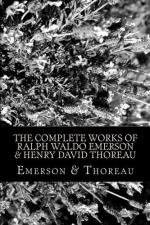|
This section contains 14,620 words (approx. 49 pages at 300 words per page) |

|
SOURCE: “‘Living Property’: Emerson's Ethics,” in ESQ: A Journal of the American Renaissance, Vol. 41, No. 3, 1995, pp. 177-247.
In the following essay, Albrecht examines Emerson's ethical philosophy in the context of such essays as “Self-Reliance” and “Experience.”
[T]hat which a man is, does always by necessity acquire, and what the man acquires is living property.
—Emerson, “Self-Reliance”
What a man does, that he has. What has he to do with hope or fear? In himself is his might. Let him regard no good as solid but that which is in his nature, and which must grow out of him as long as he exists. The goods of fortune may come and go like summer leaves; let him scatter them on every wind as the momentary signs of his infinite productiveness.
—Emerson, “Spiritual Laws”
“When will you mend Montaigne?” Emerson challenged himself in 1835: “Where are your Essays? Can you...
|
This section contains 14,620 words (approx. 49 pages at 300 words per page) |

|


